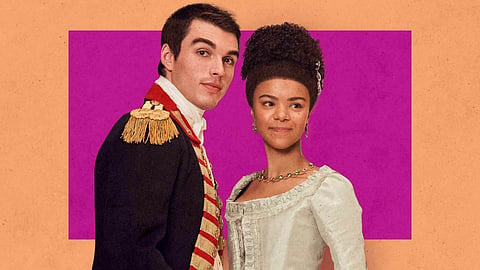
- Reviews
- Power List 2024
- Cannes 2024
- In-Depth Stories
- Web Stories
- News
- FC Lists
- Interviews
- Features
- FC SpecialsFC Specials

Creator: Shonda Rhimes
Director: Tom Verica
Cast: India Amarteifio, Corey Mylchreest, Michelle Fairley, Golda Rosheuvel, Arsema Thomas
Queen Charlotte: A Bridgerton Story is a tale of hands – clasped in reassurance, joined in dance, pressed against a mouth, outstretched in a show of support, intertwined in solidarity. Several times over, the camera lingers on this motif, recurring across timelines, trials and triumphs to ultimately tell the story of a man who keeps the woman he loves at arm’s length (ironic!) because he’s afraid of what she’ll discover if she gets too close. When every recent romance like The Lost City (2022), Shotgun Wedding (2022) and Ghosted (2023), is an action-movie mashup, explosive chemistry eventually giving way to actual explosions, Queen Charlotte is content to lean on its exquisitely crafted atmosphere of chemistry, yearning and anticipation. “Oh you enjoyed the Darcy hand flex?” it seems to ask, “Here, have a dozen more.” This is the swoony, sexy, sad love story you’ve been waiting for.
To this show, however, the most crucial pair of hands are those that remain unoffered. The young Princess Charlotte (India Amarteifio) of Germany, having been betrothed to King George III (Corey Mylchreest) of England, decides to hop over the palace wall and escape on her wedding day. She asks a stranger she meets in the garden for a helping hand, unbeknownst to her that he’s her future husband. He refuses, they banter, there’s a spark of attraction. The episode economically establishes the thrill of getting to know someone intimately when they were a stranger just seconds earlier and then upends it with the ache of realizing you didn’t really know them at all. George’s love for Charlotte is only matched by his fear that she’ll find out about the secret he’s harbouring. And so he pushes her away, while she tries to bridge the gap between them.
The show flits back and forth between this summer of new beginnings and the despondent winter chill of the present day, in which Charlotte, now Queen (Golda Rosheuvel) must select a new heir after her oldest child’s wife dies in childbirth. That George isn’t around casts a tragic shadow over their love story in hindsight, and flashes of Charlotte’s headstrong personality in the past lay the groundwork for the wife and queen she’ll become someday. A pervasive sense of loneliness hangs around the edges of the show – young Charlotte’s desperate attempts to connect to her husband, the older Charlotte’s despair at ending up alone anyway. Despite Queen Charlotte’s distinct timelines, she remains very much a person frozen in time, pining for a future that never is. If love is inextricable from heartache, what makes it worth it? the show asks. The answer lies in Amarteifio and Mylchreest’s palpable chemistry and tender warmth as they traverse this strangers-to-begrudging-allies-to-loving partners arc, weighing their internal conflicts against their insistent impulse to be together.
Since this is a Bridgerton spin-off after all, all this banter must eventually lead to the bedroom. Sex, sex talk and sex diagrams abound in the distinctly unsexy first few episodes, on which the enthusiastic creaking of a bedframe is followed by dentures being deposited into a bedside container. Sex is dully referred to as “the marital act” and treated as a chore. Gradually, however, the narrative friction translates to the characters. Charlotte and George evolve into two people who can’t stand the sight of each other but can’t keep their hands off each other either. When they have trouble communicating verbally, they let their physicality do the work. The show also makes space for queer desire, and female desire (at any age). One of its most endearing sequences is set in present day, when two older women (Adjoa Andoh, Ruth Gemmell) have a frank discussion of their libido, referring to it as their "garden blooming" to be discreet.
The one awkward spot in Queen Charlotte, however, is its handling of race. Charlotte is the first Black woman to marry into the royal family, an “experiment” to unite both races in the realm. Except that the word “race” or even “Black” is never mentioned. There’s talk of “our side” and “their side”, Charlotte is referred to as the “first of her kind”, but the characters dance around any actual terminology as nimbly as they do at their many, many fancy balls. There’s clearly a race problem, but even the people are too genteel to say it, the show is too timid to confront it. There are microaggressions about the tone of Charlotte’s skin in a royal portrait and larger questions of whether Black gentlemen can inherit titles the way White men do, but the ideas are too broad for Queen Charlotte to really get into the minutiae.
At one point in the show, a prospective bride is inspected by the King’s mother (Michelle Fairley), as though she were a barnyard animal. The indignity of having her hands and teeth checked offset the scene’s fitted gowns, the women’s tight ringlets and the prim opulence of the palace rooms. This has always been one of the joys of the Bridgerton franchise, its ability to juxtapose the highbrow and lowbrow – a classical rendition of a pop song here, a Regency era Gossip Girl-esque newsletter there – all held together with a caustic wit and a ceaseless charm. Even the scheming is more delightfully cheeky than downright devious. Queen Charlotte is more of the same, fun and frivolous. It’s also a sweeping love story for the streaming era.